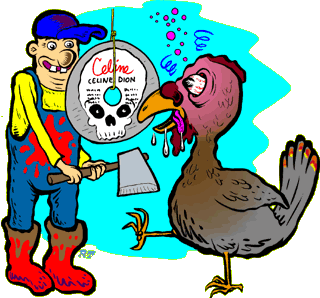
Dead turkey walking. Not all turkeys in America are slaughtered in the weeks leading up to Thanksgiving; a sizable number of them are kept alive so they can be slaughtered for Christmas. But something happens to turkeys during that four-week gap; the ones remaining on death row seem to know that some sort of mass extinction has occurred, and they become listless and stop eating. Animal behavior researcher Michael Forbes has discovered a way to keep his Christmas turkeys happy: Forbes dangles compact discs on strings in his turkey coops. Pecking at the spinning, shiny circles occupies the easily amused surviving birds until they're put to death. Researchers at the Virgin Megastore have discovered the same effect among Celine Dion fans.
Fear o' mones. Pheromones -- scent chemicals that bypass the conscious brain and act directly on the limbic system -- are a proven insect aphrodisiac. It's been claimed, without evidence, that they do the same for humans. Naturally, they're available over the counter as various brands of pheromone cologne ("Guaranteed to Turn ANY Woman into a TIGER"). Now, biopsychologist Martha McClintock has detected the first human pheromones, and they seem to have only one purpose -- they serve as the triggers for the "sorority effect," the process that synchronizes the menstrual cycles of women living in close proximity. Which might explain the solo careers of Ronnie Spector, Diana Ross, and Ginger Spice.
Groom my back, sailor? A female woodmouse will mate indiscriminately with any other male woodmouse, but only if he grooms her back. Researcher Pavel Stopka, who made the discovery, believes it's yet another example of a "biological marketplace" in which female mammals trade sex for a resource like grooming or food from a male. For example, Bonobo ape females in the wild have been observed to regularly trade sex for fresh fruit -- a strategy that has evolved over 4 million years into dinner and a movie.
Eggins, your beer. Irish science has made a discovery that will surely put an end to its half-century Nobel jinx. Dr. Brian Eggins of the University of Ulster has determined that hazy draughts of Guinness are caused by an improper ratio between the ketone-like flavanols and the beer proteins in the brew. Excess flavanols adversely affect the color and taste of the beer, and are incidentally what make Guinness piss so stinky. Eggins' remedy? He's invented a bio-electrode out of some wire and polyphenol enzyme, which can be immersed in the brewing vats to determine flavanol ratios. He hopes his device will help Guinness fine-tune their brewing process to produce the Holy Grail of Eire -- a perfect pint every time.
Bigger, healthier, extinct. Researchers at Purdue University have found that in certain cases, a single genetically modified fish released into the wild can wipe out an entire bioregion. The GM fish are designed to be bigger. Bigger fish generally mate more, so they leave more GM offspring, which mate more and leave more GM offspring and so on. The problem is, the GM fish die too soon. Their birth rate can't keep up with their premature death rate, and within a few dozen generations there's a population crash. This appears to be strong evidence against releasing genetically modified animals into the wild. However, such a process might actually be helpful among Christmas turkeys, Spice Girls, and chemically altered Irishmen.
Patrick Di Justo trades sex for fruit whenever possible.
Future Schlock runs every other Tuesday on GettingIt.
